Swimming World Championships 2023: Aussies on target for record medal haul, NBC medal tally farce
Not for the first time, the US have tried to claim bragging rights – but Australia’s all-conquering swimmers are having the last laugh after one brazen attempt to flip the table.
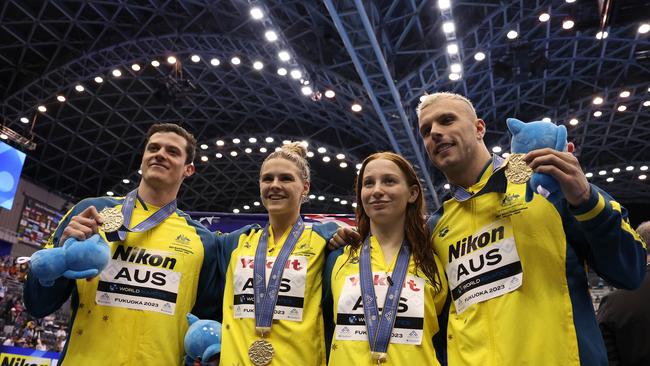
Australia’s incredible swimmers have laughed off a lame attempt by American broadcasting giant NBC to claim the United States is the number one country at the world championships in Japan.
With 13 gold medals already in the bag, the Aussies have an unassailable lead at the top of the medals table. With just seven races to go on Sunday, China (five gold and the United States (four gold) cannot catch the Dolphins.
That was at least until NBC decided midway through the competition to change the order to total medals won, a format which put America (31 medals in total) ahead of the Aussies (20).
It’s not the first time the Stars and Stripes have flipped the medals table around to put themselves on top and claim bragging rights.
They did the same in 2001 when the Aussies won more golds but less overall, but no-one is buying it – especially the Australian team.
“I think it’s always been gold medals so I think this year will be no different,” Kyle Chalmers said.
One of these medal tallies at the World Swimming Championships was compiled by an American TV network.
— ajgardineresq@threads.net (@AJGardineresq) July 29, 2023
Can you guess which one?#Fukuoka2023pic.twitter.com/Rl49FtIbmf
“They’ll always probably try and find a way to sneak it to make it look like they’re the better team.
“But I think this year we’ve done it, so hopefully they let us enjoy our moment.”
Chalmers helped Australia set yet another world record to claim a record-equalling 13th gold medal in Fukuoka on Sunday to guarantee the Dolphins will finish as the number one nation in the world leading into next year’s Paris Olympics.
After Cam McEvoy won the men’s 50m freestyle gold and Kaylee McKeown completed the backstroke treble by taking out the 200m, the Australian mixed 4x100m freestyle relay smashed the world record to claim the team’s 13th gold medal.
“It’s something that Australia was able to do back in Fukuoka in 2001 so to do that again and be a part of hopefully one of Australia’s most successful teams is so inspiring,” Chalmers said.
“Coming into this marshalling room with some of these girls like Mollie, it’s just incredible, it’s actually just mind blowing what the girls have managed to achieve this week and some of the boys as well, it’s crazy.”

With Jack Cartwright swimming the lead-off, followed by Chalmers and Shayna Jack before handing off to Mollie O’Callaghan for the anchor leg, it was almost a foregone conclusion.
In second place at the halfway stage, the Aussies took the lead after Jack’s leg and no-one was ever going to catch O’Callaghan, who had won the individual 100m and 200m titles.
She surged away from the field to touch the wall in a combined time of 3:18.83 – wiping half a second off the previous world record Australia set at last year’s world titles in Budapest.
O’Callaghan has five gold medals in Fukuoka – including four in world record times. The only Australian woman to win five gold medals at a single world championships was Libby Trickett in 2005.
“I am too busy to think about it to be honest,” O’Callaghan said.
“I have just had a lot going on this week and I have just got to maintain it and be as professional as possible, just sticking around with the team and keeping it quite closed has helped me instead of on social media doing this and that, I have just tried to keep it as composed as possible.”
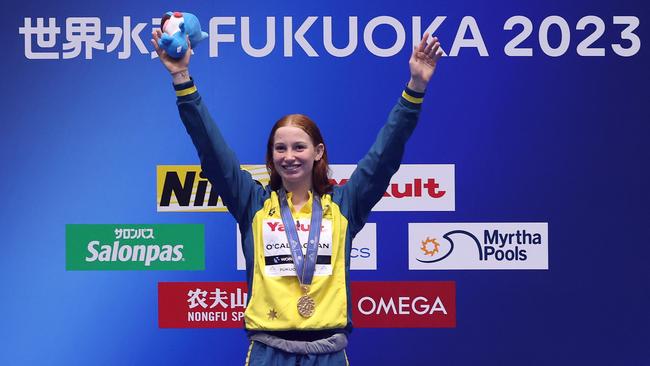
The most by an Aussie male is six, set by Ian Thorpe at Fukuoka in 2001.
Chalmers and Jack also have three gold medals while Cartwright has two.
Ariarne Titmus picked up a bronze in the women’s 800m freestyle, won by American Katie Ledecky.
Chalmrers said it was the best Australian team he had been on.
“I think we have so much amazing talent on the team like these young girls like Mollie and Shayna, who is my age, but Mollie and Kaylee and Ariarne and even Sam Short on the boys side,” he said.
“There’s just these guys that are absolutely incredible and finding ways to win. Early on in my career, I think it was kind of rare for us at times to get a gold medal.
“We might get a couple here and there. I think in Rio we had three gold medals for the whole entire competition. So to now have such a massive amount in so many different individuals it is incredible and exciting.
“I hope everyone in Australia and on the team realises how special it actually is to win a gold medal for your country at the highest level to stay composed and do it when it counts most.”
‘INSANE’ GOLD, RELAY WIN PUTS AUSSIES ON TOP OF WORLD
Australia’s swimming’s mad scientist Cam McEvoy has proven all the sceptics wrong.
At 29, an age when most swimmers have hung up their goggles, McEvoy has become champion of the world.
Not only that, he’s become the oldest Australian swimmer ever to win an individual world title after storming to victory in the 50m freestyle sprint in a sizzling time of 21.06 seconds – the fourth-fastest time in history and a new Australian record.
“It’s insane. I never ever thought I would be down in that range,” McEvoy said.
“When I started in October I just wanted to go 21 (seconds) again, I hadn’t been 21 since 2019, I had never made an international 50m free final until this year ... I have come a long way a lot faster than I thought.”
Of all the gold medals the Dolphins have won in Fukuoka, McEvoy’s is the most astounding because of the incalculable odds he overcame to pull it off.
“That was incredible. To do a swim like that, that nice in the water, I had such good fun,” he said. “Everything about what I love in swimming culminated in that.”
Nicknamed the professor because he’s a self-confessed physics and mathematics geek, McEvoy was ready to quit swimming after the Tokyo Olympics.
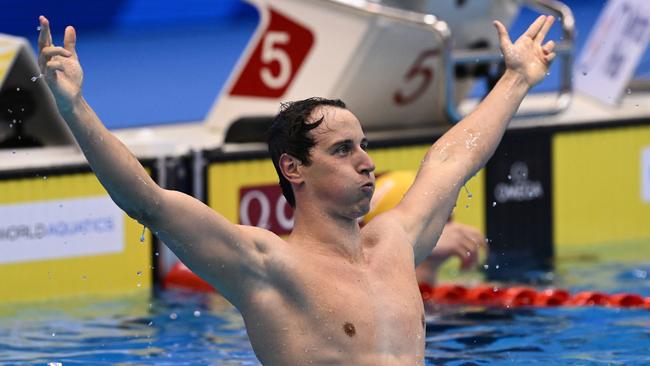
Tired of the long, gruelling training sessions he had put his pencil-thin body through for scant reward, he gave it one last shot after deciding to carry out a radical experiment on himself.
His theory was that to go faster in water, he needed to spend less time in it and more muscling up in the gym.
So he got himself buffed up – packing on an extra 10kg – and the results are there for everyone to see.
“It will take me a long time to be able to process it and put it into coherent words,” he said.
“Above all, it’s partly relieving and partly very justifying because I have had such a long period of time where I have had my ideas and beliefs about various ways of training and it wasn’t until last October.
“They gave me the space to have freedom to put it in motion. It’s justifying and gratifying.
“There were probably three or four times today when I almost had tears come up, well up in my eyes, just out of being so proud of being in this position and having the privilege of not only going out in lane four in a final as favourite but to be able to be pretty much at my full potential at an international meet.
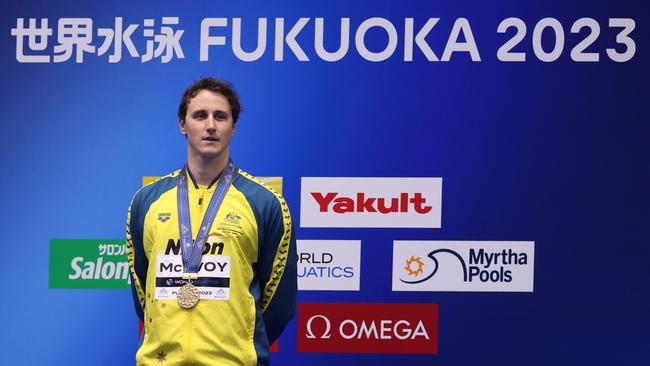
“Last time I got an individual medal was 2015, it had been so long, I thought that opportunity had gone.
“And to see how much more I can go in terms of the longevity in the 50 free is really exciting.”
McEvoy also became the first Australian man to win the 50m freestyle gold medal at either the world championships or Olympics so will go to Paris next year as one of the favourites.
And he could have some company after his young teammate Isaac Cooper, finished fourth.
“Hopefully our different training methods feeds back into the swimming community we have and either gives older guys a little bit more longevity in the sport or allows others to hit their potential when they may not have necessarily hit it,” McEvoy said.
“I was just trying to dive in and not think about anything but now that it’s happened I Just need to process it. It’s been a long time coming.
“I’m very privileged to be able to swim for Australia…it’s just awesome.
“As a team we’ve been incredible this week so it’s hard not to tap into that and go with the flow.”
Another Aussie gold, world record smashed
Australia has set yet another world record to claim a record-equalling 13th gold medal at the world titles in Japan, guaranteeing the Dolphins will finish the world championships as the No.1 nation in the world leading into next year’s Paris Olympics.
After Cam McEvoy won the men’s 50m freestyle gold and Kaylee McKeown completed the backstroke treble by taking out the 200m, the Australian mixed 4x100m freestyle relay smashed the world record to claim the team’s 13th gold medal.
With Jack Cartwright swimming the lead-off, followed by Kyle Chalmers and Shayna Jack before handing off to Mollie O’Callaghan for the anchor leg, it was almost a foregone conclusion.
In second place at the halfway stage, the Aussies took the lead after Jack’s leg and no one was ever going to catch O’Callaghan, who had won the individual 100m and 200m titles.
She surged away from the field to touch the wall in a combined time of 3:18.83 – wiping half a second off the previous world record Australia set at last year’s world titles in Budapest.
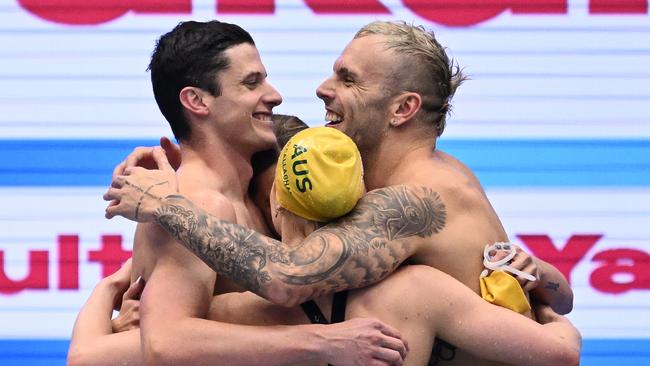
O’Callaghan has five gold medals in Fukuoka – including four in world record times. The only Australian woman to win five gold medals at a single world championships was Libby Trickett in 2005.
The most by a man is six, set by Ian Thorpe at Fukuoka in 2001, which was the last and only time Australia finished on top of the medals table.
The Aussies won 13 then – a record they matched in 2005 – but there’s still one day to go this time.
With seven finals on the last day the Aussies have a great shot of breaking their own record, but with China in second place with five golds, no one can topple the Dolphins from top place.
Chalmers and Jack also have three gold medals, while Cartwright has two.
Ariarne Titmus picked up a bronze in the women’s 800m freestyle, won by American Katie Ledecky, who overtook Michael Phelps as the most successful swimmer at the world championship with 16 individual golds over her career.
Frenemies forever: How Arnie helped Ledecky become the GOAT
As great as Australia’s swimmers are, and they are up there with the very best, none would disagree who the Greatest of All Time is – American superstar Katie Ledecky.
One of the big reasons why Ariarne Titmus’ victories in 400m freestyle at the 2021 Tokyo Olympics and the 2019 and current world championships are so highly valued is because in each of them she beat Ledecky.
That’s a very rare feat and while it’s fair to say that over 400m, the Australian has Ledecky covered, overall, the American has everyone covered, which is why she is the undisputed GOAT.
Currently 26 and showing no signs of finishing even after a decade at the highest level, Ledecky’s legend just keeps growing.
One by one, she has surpassed all the records and achievements of everyone who has ever dived into a pool and rolled their arm over.
No-one has spared. Not even Michael Phelps.
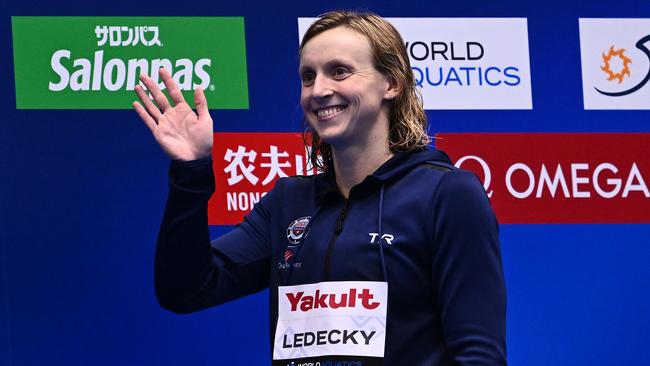
Ledecky has transformed women’s distance swimming since she burst on the world stage as a teenager at the 2012 London Olympics, winning gold in 800m freestyle.
She has gone and won multiple world and Olympic titles at 200m, 400m, 800m and 1500m in the years since but the 800m is her baby.
Barring a monumental upset, Ledecky will claim her sixth consecutive 800m world title at Fukuoka on Saturday, adding two more remarkable records to her growing list of accomplishments.
If she takes the gold, she will become the first swimmer – male or female – to win the same event at the world championships six times. Not only that, but she will claim her 16th individual title, moving one clear of Michael Phelps, whom she currently shares the record with.
“Katie is a phenomenal athlete,” her coach Anthony Nesty told this masthead.
“Her work ethic is unmatched and this is evidenced in her performances. She is a student of the sport and works tirelessly to achieve the pinnacles of the sport.
“She is committed and focused. She is relentless in her approach, working constantly to fine tune an athletic recipe that yields extraordinary results.
“Katie is very driven and ambitious. I look forward to seeing her continue her trek to the pinnacles. She is still extremely hungry.”
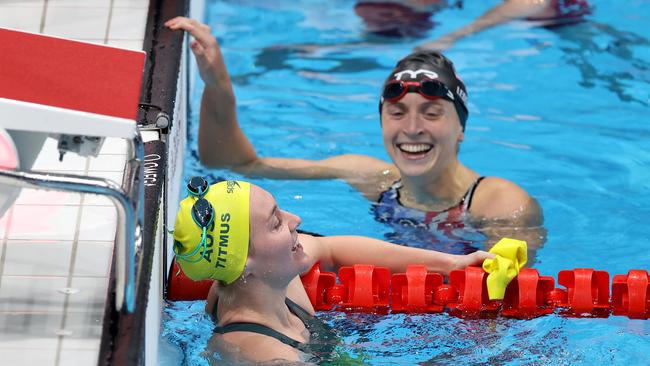
Nesty’s praise of Ledecky speaks volumes.
An Olympic champion himself, and now one of the top coaches in the world, Nesty is not known for making big statements about his swimmers, but Ledecky isn’t just any swimmer.
Titmus often speaks about her deep respect for Ledecky, how she inspired her to chase her own dreams. It’s become a mutual admiration where both women have pushed each other and benefited as well.
On paper, Titmus is Ledecky’s biggest danger in Saturday’s 800m final.
The Terminator has the heart of a lion and will fight all the way to the end but in truth, it would take something special for her to win.
Although Titmus is second, behind Ledecky, in the all-time rankings for 800m, it’s a misleading statistic.
Of the fastest 30 times ever recorded for the women’s 800m, the top 29 were swum by Ledecky, including her world record of 8:04.79.
Titmus holds the 30th best time – 8:13.83 – which she posted when finishing runner-up at the Tokyo Olympics.
The Australian rarely gets the credit she deserves for that swim because she finished with silver after winning gold in the 200m and 400m but she rates it as her best performance.
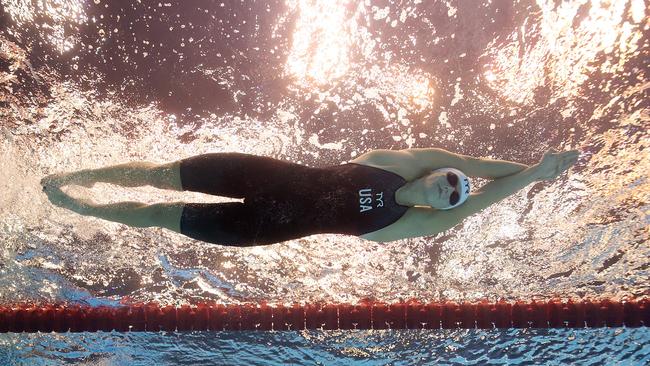
“It potentially gets overlooked because Katie is in a class of her own in the 800m,” Titmus said. “I believe her world record is going to stand for a long time.
“I probably do put more pressure on myself for the other two (races) because I know they are my major chances for the medals.
“But I do forget that sometimes my 800m is a silver medal winning swim at the Olympics. It was probably my best race in Tokyo.”
As well as all her medals. Ledecky has also been named female world swimmer of the year six times, including this past year. And she has a pristine reputation as a consummate professional outside of the pool.
Although her schedule is always busy, she never turns down requests to talk with n
media, knowing it’s the best way to connect with fans and promote the sport without impacting on her performances.
And she’s not even close to finishing yet – already saying she wants to keep going at least until the 2028 Los Angeles 0lympics.
“It feels great. I’m just really enjoying swimming right now, especially my distance events,” she said.
“I feel like I’m getting better each time I swim them, and that’s what you love to see. You love to see improvement, and that’s been my biggest goal over the last couple of years.”
KATIE LEDECKY’S INDIVIDUAL WORLD CHAMPIONSHIP GOLD MEDALS
2013 – 400m freestyle, 800m freestyle, 1500m freestyle
2015 – 200m freestyle, 400m freestyle, 800m freestyle, 1500m freestyle
2017 – 400m freestyle, 800m freestyle, 1500m freestyle
2019 – 800m freestyle
2022 – 400m freestyle, 800m freestyle, 1500m freestyle
2023 – 1500m freestyle






To join the conversation, please log in. Don't have an account? Register
Join the conversation, you are commenting as Logout